Guthrie Thomas
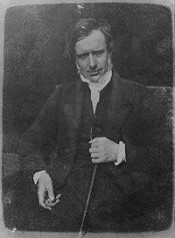
Thomas Guthrie D.D. (1803 – 1873) was a Scottish divine and philanthropist, born at Brechin in Angus (at that time also called Forfarshire). He was one of the most popular preachers of his day in Scotland, and was associated with many forms of philanthropy - especially temperance and Ragged Schools, of which he was a founder. He studied for the Church, and became the Minister of Arbirlot, in Angus, and then of Free St. John's chapel Edinburgh. Possessed of a commanding presence and voice, and a remarkably effective and picturesque style of oratory, he became perhaps the most popular preacher of his day in Scotland, and was associated with many forms of philanthropy, especially temperance and ragged schools, of which he was a founder. His hard work as a proponent and founder of Ragged Schools led him to be quoted by Samuel Smiles in his famous book Self Help.[1] He was one of the leaders of the Free Church of Scotland, and raised over £100,000 for manses for its ministers. Among his writings are The Gospel in Ezekiel and Plea for Ragged Schools (1847)[2], and The City, its Sins and Sorrows. His statue on Edinburgh's Princes Street bears the following inscriptions: Thomas Guthrie died in 1873 and was buried in The Grange cemetery. His will[3] left his copy of the National Covenant to the Free Church. Thomas Guthrie was father of Lord Guthrie and the great-grandfather of Tyrone Guthrie (1900-1971), a theatre director in Britain, Canada and Ireland. This article incorporates public domain text from: Cousin, John William (1910). A Short Biographical Dictionary of English Literature. London, J. M. Dent & sons; New York, E. P. Dutton.
do you like this author?
What readers are saying
What do you think? Write your own comment on this book!
write a commentWhat readers are saying
What do you think? Write your own comment on this author!
write a commentBook list
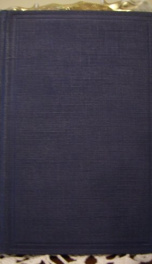
the parables read in the light of the present day
Series:
Unknown
Year:
Unknown
Raiting:
5/5
Purchase of this book includes free trial access to www.million-books.com where you can read more than a million books for free. This is an OCR edition with typos. Excerpt from book: THE PARABLE OF THE TEN VIRGINS. " Then shall tht kingdom of heaven bt likened unto ten virgins, which took their lamps, and went forth to meet the bridegroom," tyc. fyc.Matthew xxv. 1-13. HPHIS parable is founded on a marriage scene. Though as, for example, in wars, or in the Corinthian gamesthe Scriptures are not to be regarded as approv- ing of all things which they may employ as figures, approbation and honour are bestowed on marriage by the lofty uses to which the sacred writers turn it. With prophets and apostles it shadows forth the holy, intimate, eternal union which is formed between God's beloved Son and his chosen people. Those who feel a Christian interest in the purity and happiness of society, will not regard that as a circumstance of no value. Such discredit as the Popish Church throws on marriage, by representing it as less holy and honourable than celibacy, and such impediments as pride and ambition throw in its way, should be denounced by those who, as Christian ministers, ought tobe Christian moralists,preaching to the times. One of their most evil features is the false standard of income and position which it is considered proper they who intend to marry should in the first place secure. This has led to the bitterest disappofntments ; to breach of vows ; to broken hearts,besides being the fruitful source of much crime, and furnishing the licentious with an apology for their immoralities. On this altar, human happiness, as well as the best interests of morality, are offered up in cruel sacrifice. "A man's life," as Scripture saith, "consisteth not in the abundance of the things which he possesseth, a dinner of herbs where love is, is better than a stalled ox, and hatred therewith." The institution which forms the basis of this parable is one ...
Show more
add to favoritesadd In favorites

the city its sins and sorrows being a series of sermons from luke xix41
Series:
Unknown
Year:
Unknown
Raiting:
5/5
Show more
add to favoritesadd In favorites
Book list

the parables read in the light of the present day
Series:
Unknown
Year:
Unknown
Raiting:
5/5
Purchase of this book includes free trial access to www.million-books.com where you can read more than a million books for free. This is an OCR edition with typos. Excerpt from book: THE PARABLE OF THE TEN VIRGINS. " Then shall tht kingdom of heaven bt likened unto ten virgins, which took their lamps, and went forth to meet the bridegroom," tyc. fyc.Matthew xxv. 1-13. HPHIS parable is founded on a marriage scene. Though as, for example, in wars, or in the Corinthian gamesthe Scriptures are not to be regarded as approv- ing of all things which they may employ as figures, approbation and honour are bestowed on marriage by the lofty uses to which the sacred writers turn it. With prophets and apostles it shadows forth the holy, intimate, eternal union which is formed between God's beloved Son and his chosen people. Those who feel a Christian interest in the purity and happiness of society, will not regard that as a circumstance of no value. Such discredit as the Popish Church throws on marriage, by representing it as less holy and honourable than celibacy, and such impediments as pride and ambition throw in its way, should be denounced by those who, as Christian ministers, ought tobe Christian moralists,preaching to the times. One of their most evil features is the false standard of income and position which it is considered proper they who intend to marry should in the first place secure. This has led to the bitterest disappofntments ; to breach of vows ; to broken hearts,besides being the fruitful source of much crime, and furnishing the licentious with an apology for their immoralities. On this altar, human happiness, as well as the best interests of morality, are offered up in cruel sacrifice. "A man's life," as Scripture saith, "consisteth not in the abundance of the things which he possesseth, a dinner of herbs where love is, is better than a stalled ox, and hatred therewith." The institution which forms the basis of this parable is one ...
Show more
add to favoritesadd In favorites

the city its sins and sorrows being a series of sermons from luke xix41
Series:
Unknown
Year:
Unknown
Raiting:
5/5
Show more
add to favoritesadd In favorites
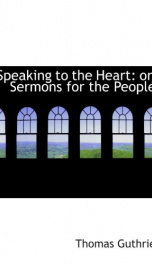
speaking to the heart or sermons for the people
Series:
Unknown
Year:
Unknown
Raiting:
5/5
Show more
add to favoritesadd In favorites
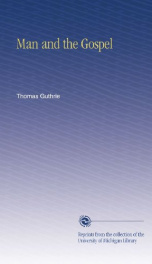
man and the gospel
Series:
Unknown
Year:
Unknown
Raiting:
5/5
This volume is produced from digital images created through the University of Michigan University Library's preservation reformatting program. The Library seeks to preserve the intellectual content of items in a manner that facilitates and promotes a variety of uses. The digital reformatting process results in an electronic version of the text that can both be accessed online and used to create new print copies. This book and thousands of others can be found in the digital collections of the University of Michigan Library. The University Library also understands and values the utility of print, and makes reprints available through its Scholarly Publishing Office.
Show more
add to favoritesadd In favorites
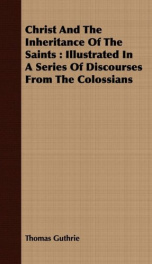
christ and the inheritance of the saints
Series:
Unknown
Year:
Unknown
Raiting:
5/5
Many of the earliest books, particularly those dating back to the 1900s and before, are now extremely scarce and increasingly expensive. We are republishing these classic works in affordable, high quality, modern editions, using the original text and artwork.
Show more
add to favoritesadd In favorites

The Angels' Song
Series:
Unknown
Year:
Unknown
Raiting:
4.5/5
Reverend Thomas Guthrie D. D. (1803-1873) was a Scottish divine and philanthropist. He was one of the most popular preachers of his day in Scotland, and was associated with many forms of philanthropy - especially temperance and Ragged Schools, of which he was a founder. He studied for the Church, and became the Minister of Free St. John's chapel Edinburgh. His hard work as a proponent and founder of Ragged Schools led him to be quoted by Samuel Smiles in his famous book Self Help. He was one of the leaders of the Free Church of Scotland, and raised over £100,000 for manses for its ministers. Among his writings are Plea for Ragged Schools (1847), The Gospel in Ezekiel (1855), The City, Its Sins and Sorrows (1857) and The Angels' Song (1866). --This text refers to an alternate Paperback edition.
Show more
add to favoritesadd In favorites
What readers are saying
What do you think? Write your own comment on this author!
write a commentif you like Guthrie Thomas try:
readers also enjoyed
What readers are saying
What do you think? Write your own comment on this author!
write a commentGenre
if you like Guthrie Thomas try:
readers also enjoyed
Do you want to exchange books? It’s EASY!
Get registered and find other users who want to give their favourite books to good hands!

